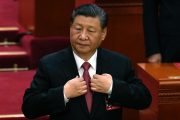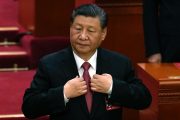
Many Chinese internet users have pleaded desperately for permission to access to their WeChat accounts after the authorities blocked hundreds of accounts over posts about a rare protest in Beijing against President Xi Jinping and his draconian Covid-19 policies.
The WeChat social-media app is vital for everyday life in Communist China, as it is the platform through which millions of people communicate with one another, make payment transactions, access entertainment options, as well as participate in Covid-19 contact tracing. Notably, the communist regime also relies on WeChat to closely keep an eye on users’ actions.
After hundreds of WeChat users alluded to a rare but small-scale protest in Beijing on October 13 that called for Xi’s ouster, they have had their accounts banned, some permanently. Such widespread state blocking of users’ WeChat accounts comes amid Xi’s further entrenchment in power with his slated historic third term.
“I have really seriously reflected on my mistake, and I promise … I will definitely strictly abide by the guidelines,” posted one Beijing resident on another Chinese social network. The post has since been removed.
“I sincerely hope your company can unblock my account. In future, I will never post an inappropriate video or image again.”
Another user whose WeChat account had been banned for good lamented, “I’ve been extremely anxious since it happened and regret my behavior.”
“I’ve used this account for 10 years and there are many precious photos and messages from friends on it.”
One WeChat user from the southern city of Guangzhou revealed to Agence France-Presse that some functions on her account were momentarily suspended for 24 hours after she shared photos in a chat group of posters declaring support for the Beijing protest.
“I can feel the isolation of not being able to like/respond/reply to group chat messages … and I feel even more sympathy for users who have been permanently banned,” she said.
Beijing is keeping a close watch on any possible disturbance to its Communist Party meeting, which began on Sunday and will last for a week. The city is under intense security and surveillance.
Last week, videos and photos depicting a lone protester, whom netizens later identified as Peng Lifa, hanging two hand-painted banners off Sitong bridge in Beijing with slogans denouncing freedom-restricting Covid-19 measures in the country as well as advocating for the right to vote, were circulated on social media.
“No Covid tests, I want to make a living. No Cultural Revolution, I want reforms. No lockdowns, I want freedom. No leaders, I want to vote. No lies, I want dignity. I won’t be a slave, I’ll be a citizen,” one banner declared.
“Go on strike, remove dictator and national traitor Xi Jinping,” indicated the other.
Security forces promptly surrounded the bridge and volunteers were dispatched to other pedestrian bridges across Beijing following the protest. Also, online searches for the rare incident were tightly curtailed.
At first, the alleged protestor Peng got away from his protest scot-free by wearing a hard hat and an orange vest that city workers wear. Later, however, Peng was detained by police after he put up the banners, based on videos online.
Peng, who is supposedly a physicist in China, also began a fire and courageously broadcasted his slogans on the bridge to attract attention.
The Straits Times, Singapore’s national newspaper, failed to independently authenticate the protestor’s identity. The man had been identified by U.S.-based Chinese writer and blogger Fang Shimin, who announced on Twitter that he had communicated with Peng previously. When contacted by The Straits Times, Fang did not respond.
Meanwhile, young Chinese overseas have taken up the protester’s call to put Xi’s draconian Covid-19 measures under scrutiny, amid Chinese state attempts to eradicate mentions of the protest on Chinese social media.
Overseas Chinese students in cities such as London, New York, Amsterdam, Paris, and Seoul have put up posters with slogans containing messages such as, “We want freedom, not lockdowns,” “We want dignity, no more lies,” and “We want to be citizens, not slaves” on university bulletin boards, lamp posts, and in train stations. Such actions mirror the students’ unhappiness with Xi’s political leadership back in China and were catalyzed by Peng’s actions on Sitong Bridge.
These overseas students admitted that they worried for the safety of the alleged protestor Peng, whom they referred to as “Bridge Man.” The reference brings to mind the “Tank Man” who bravely stood in front of armored vehicles to defend protesters in Tiananmen Square on June 4, 1989.
The reason for the students’ concerns for Peng’s life is that Peng had risked his life to question Xi and to express the widespread dissatisfaction in China about the communist regime’s severe Covid-19 controls. China is the last major economy to persist doggedly with its compulsory Covid-19 testing, abrupt lockdowns, and strict border controls that have undermined lives and livelihoods.
Ann Zhang, 25, a postgraduate student in London, invested three hours of her time to put up posters echoing Peng’s slogans around her school campus. Zhang admitted she felt encouraged after seeing other people’s posters in London.
“I can understand that some issues are just out of the government’s capacity to deal with, but it’s just unfair to shut people’s mouths,” Zhang added, indicating that she did not want Peng’s sacrifice to go to waste.
Zhang and her friends opted to put up the posters on Sunday to avoid notice, as fewer people were on campus. Moreover, she had switched off her phone to avoid digital scrutiny by the authorities. Her friends even broached the idea of wearing gloves to avoid leaving fingerprints behind.
A Chinese undergraduate in Canada, who wanted to be known only as Lorraine, drove five hours to the Chinese consulate in Toronto to join protesters who were holding a banner similar to the one Peng put up in Beijing.
“I hope I can keep Mr Peng’s spirit alive,” said Lorraine, who has about 9,000 followers on Twitter.
Lorraine recounted being bullied in high school in China by her class monitor, who supported China’s communist regime. Her classmates refused to do group work with her due to her political views. Furthermore, China’s censors have locked Lorraine’s Weibo account several times.
When probed further, the students refused to offer more details about themselves in order to protect themselves, their families, and friends who are still in communist China.
In Amsterdam, postgraduate student Yi Senni, 25, admitted that she had placed posters near the Dutch capital’s train station.
“I want them to be seen by many people,” Yi said.
Yi expressed her admiration for Peng’s courage for doing what she was too afraid to do when she was in China. Back home, Yi felt stifled due to the lack of freedom of speech.
Yi said she recounted feeling anxious when she noticed an Asian man standing near her and smiling at her.
“My first thought was, is he going to take a photo of me and report it?” she said.
“I was quite stressed while [putting up the posters]. I was afraid of being recognised by pinkies,” she said, referring to staunch supporters of the ruling CPC.
“You can’t really tell who they are…. Being Chinese, I’ve always lived with fear,” she said.



